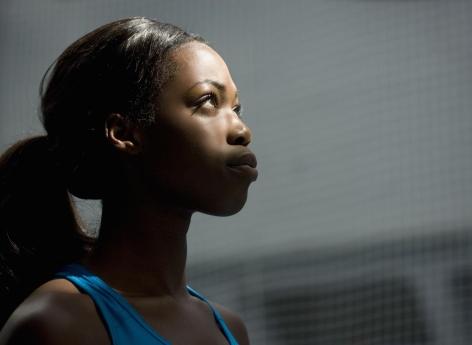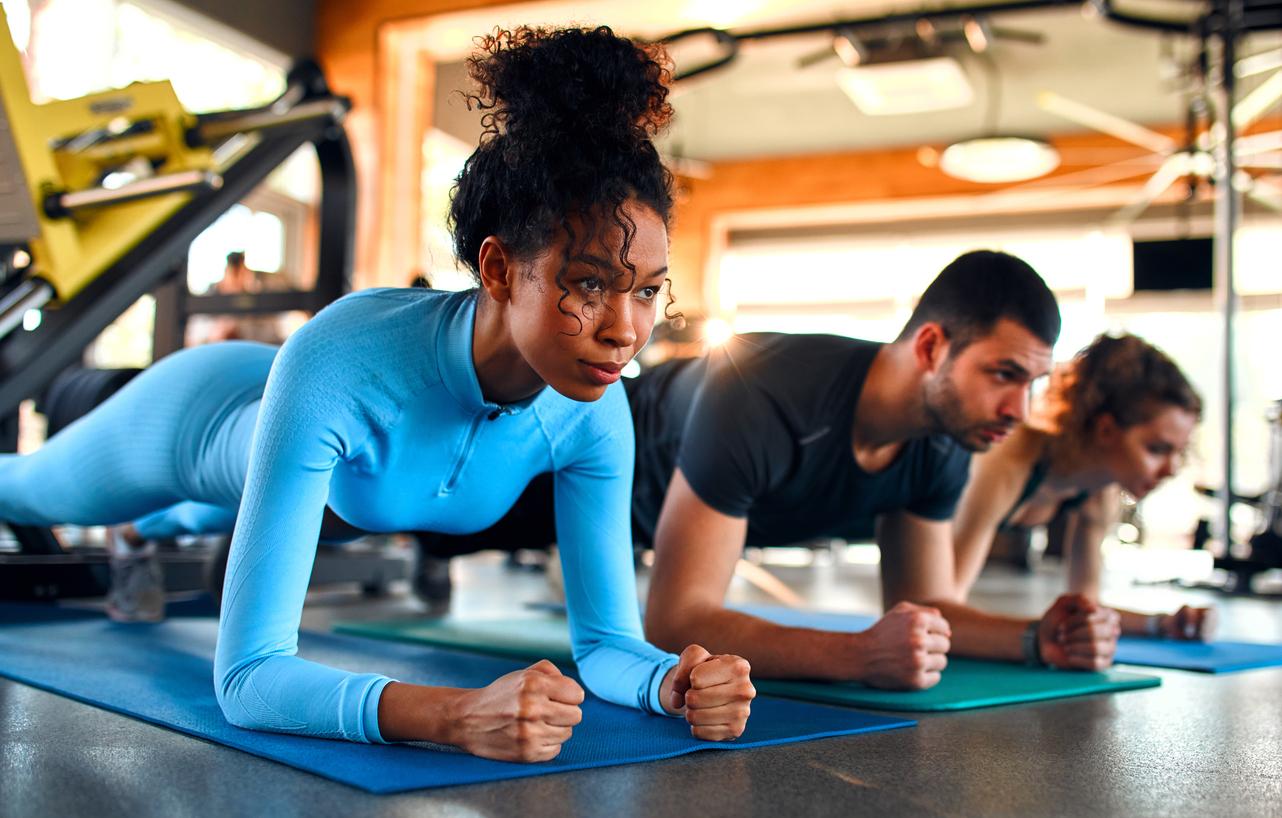This is his 3rd participation in the prestigious solo sailing race. Revealed to the general public during the Vendée Globe 2008-2009 in which she finished 4th, the adopted British and Breton sailor is an experienced sailor, a fierce competitor and a committed sportswoman. This November 8, she takes the helm of the Initiatives-Cœur boat with a double objective: to perform and save children with heart disease.
The Vendée Globe is to date the only sailing race around the world, solo, non-stop and without assistance. If physical preparation plays an important role, so does mental preparation and anticipation of the race. Meeting with a committed sportswoman and a woman of heart.
Top Health: How did you prepare physically for the race?
Samantha davies : I work with two different coaches. I have a “classic” coach to work on muscle building, endurance and cardio training, and another coach who is also a Pilates teacher. In fact the two coaches are complementary. In winter, I mainly do physical preparation because I don’t sail and in summer, when my boat is in the water, I prefer Pilates sessions to properly prepare and protect my body. What is most complicated for them is to manage to do complete programs every day, because when you are a skipper, you also have to take care of the other athlete, the boat! But also find partners, follow training … And in fact no week is alike so it’s important to have flexible coaches, who adapt and who understand our constraints. Besides, sometimes the trainer also has a role to slow you down and tell you: No this week you can’t do that!
How does Pilates help you in your preparation?
My coach is a former professional cyclist who discovered this discipline while doing rehabilitation following several injuries. Pilates is useful to prevent possible injuries, but also to prepare the body for life on the boat, where you are tight, often in uncomfortable positions, constantly in motion … and suddenly, you can hurt yourself quickly if you take bad postures. Pilates teaches you how to protect your joints, to listen more to your body and also to identify abnormal pain in order to react quickly if necessary.
Didn’t the confinement of spring delay the preparation for the Vendée Globe?
No, on the contrary, this time I had the time to devote myself solely to my physical preparation. My coach had prepared videos for me every day and since I was at home, it was finally the first time that I was able to have a life of a classic athlete, with a schedule that I could respect, it was much more framed than normal. I had aches, but I have never been so well prepared and in good shape. On the other hand, I exploded my knees, because as I was confined I did a lot of crossfit, I love it and I was thoroughly but I hurt myself. I still had one constraint, which was that I didn’t have any material, so I tinkered with everything (laughs). I did with what I had on hand, broomsticks, cans of ice-cream wipers filled and hung with strings, I had to make everything but it worked, I did all the sessions and I’m ready!
Preventing injuries also means eating well, sleeping well …
Yes, the way of eating is also very important. I have a doctor who follows this, we start with dehydrated dishes but after three weeks we have no more fruits and vegetables so we have to find a way to eat to minimize the deficiencies and not become fragile, despite the food supplements. Especially at the end of the race, between fatigue and stress, this is where you can easily get injured. We don’t sleep much, but enough to recover physically and to maintain our concentration. My sleep is fragmented, with cycles of 1.5 hours at most and 10-minute naps. The important thing is to be able to fall asleep quickly but also to wake up quickly. When you fall asleep on a stormy sea, you also need to have great confidence in your boat. I set alarms in case there is a collusion or if the wind changes direction … To sleep quickly and well and calmly, I would say that it is ultimately a lot of management, organization and experience .. .
It requires being alert and focused almost all the time, isn’t it stressful?
Yes, but you have to know how to disconnect from the boat from time to time and take advantage of the moment because there are more “cool” moments. But here too, this requires anticipating by consulting the weather forecast to identify the moments of calm before a storm, for example. It is part of the strategy to know when to take advantage of the night to sleep well or to prepare food.
What are you doing in these cooler times?
I take this opportunity to read, I don’t watch too many series unlike other skippers. Reading allows me to stay tuned to my boat in case there is a noise, a vibration that could alert me of a problem or a change in wind. But when I read, I forget the race, the strategy, the stress and sometimes it is even more relaxing for me to read than to sleep, because I often dream of racing! When I sleep my muscles are at rest but my brain continues to work, I continue to stress and it is not mentally restful. Sometimes I wake up, I wonder if I passed someone or if I was dreaming: I have to look at the standings to check! Moreover, it has happened to me to read rather than sleep, it relaxes me more, but it also requires knowing your body well and being a good judge of its capacities to identify the times when you can actually afford. not to sleep.
What do you read ?
I read a bit of everything, I like biographies, adventure stories … In fact, I take the books that you take on vacation on the beach when you need to do nothing.
Do you use relaxation techniques?
Yes I do sophrology. I started when I was doing synchronized swimming when I was young, because when you can’t swim in a pool you use those techniques to mentally visualize the movements. It helps me a lot on the boat, for example before a maneuver, I visualize it to be sure not to forget anything, to go through the stages well and not to break anything … Because if we make a mistake, we can put the boat on. or our own life in danger. I also use it to relax or fall asleep faster.
I also do a little hypnosis, it is good for athletic performance. When you have to make decisions very quickly on a boat, with stress, strategy, weather, sail changes, etc. We have a lot of things to deal with at the same time and hypnosis helps me tidy things up and sort out everything that is parasitic and for which there is no point in stressing because there is nothing we can do about it. For example, it is useless to stress if the wind is strong because you cannot change it … I also do self-hypnosis, especially before the start of a race when there is a lot of stress, it helps me to relax.
What are the most important mental qualities to embark on such a race?
I would say that you have to be motivated, be thoroughly, believe in yourself to never give up, because there are a lot of hardships to face. Patience is also an important quality, because it never goes as planned. And finally, have a sense of anticipation to think back and adapt to situations.
Do you ever have doubts or fears?
Yes, but I try not to have too much because I want to get to the start of the race telling myself that I have done everything: the efforts, the training, the maneuvers … It’s a mental preparation. I have a list of boxes to check before the race with my coaches and my goal is to arrive having checked all the boxes. And if I have a problem, it is this confidence that will allow me to manage. Finally, I can live with doubts or with fears, because the idea is to arrive on the race with the skills to be able to deal with doubts and fears.
What are your goals for the Vendée Globe 2020?
Do my best, I have an older generation boat but I was lucky enough to be able to optimize it with new foils. This year, I’m not a favorite because my boat is not going as fast as the new boats, but I can come right behind and I will play the match, if we sail well we can do something. It’s hard to say which place I want to make but I just want to be proud at the finish. I also do it with the aim of saving as many children as possible since by taking the helm of Initiatives-Coeur, I support the Mécénat Chirurgie Cardiaque association. I am very proud to have a project that combines sports performance and solidarity, it gives meaning to my sporting commitment and it can allow children to be treated, it’s magic!
Find out more about the “One click = one heart” operation on social networks
During each great sailing race, the 1 click = 1 heart operation is an opportunity to raise public awareness of the action of Cardiac Surgery Sponsorship and fundraising to help save children with heart disease.
For each subscriber to Facebook pages Where Instagram of Initiatives-Cœur, Samantha Davies’ partners donate one euro to the Mécénat Chirurgie Cardiaque association. The same goes for each comment or share. For the public it’s free. For every 12,000 euros reported, a child can come to France for surgery.
“I have the planet in front of me”
It’s a @samanthadavies euphoric that sends us the very first images of the edge of the # VendeeGlobe2020. We feel his happiness to finally take off, and he is communicative #GoSam# VG2020pic.twitter.com/s8B2bQYpsw– Heart Initiatives (@initiativecoeur) November 8, 2020
Very connected, Samantha Davies is keen to share her adventures. It sends a maximum of content from the edge! To be continued on live.initiatives-core and on his Facebook accounts and Instagram.
















